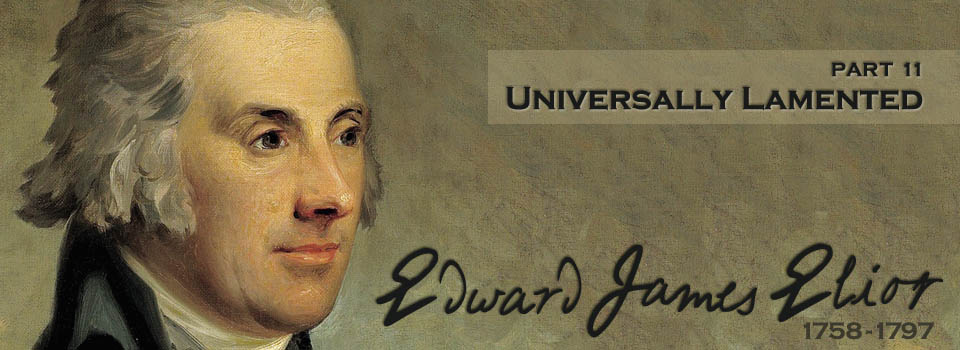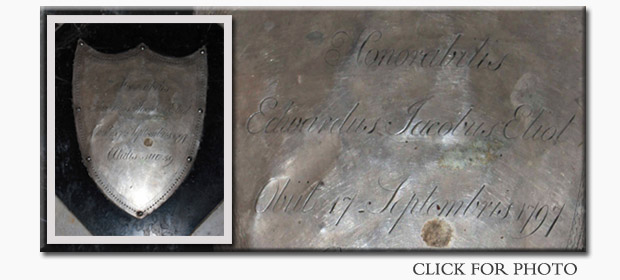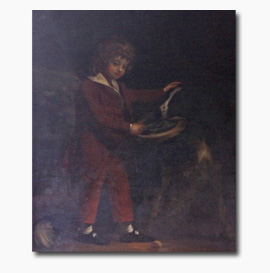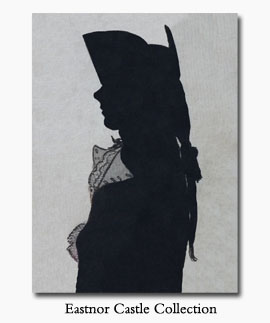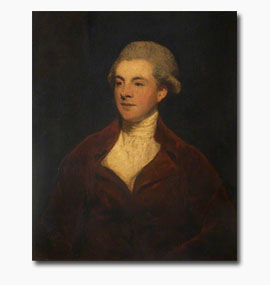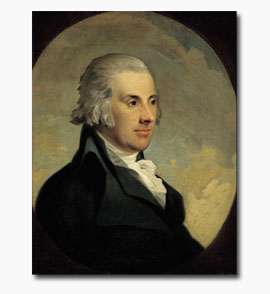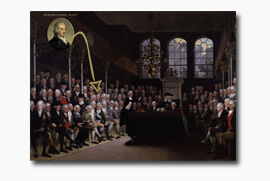Edward James Eliot: Universally Lamented
Back in 1797, there was no Cornish newspaper, and local news for the Cornwall/Devon area had to be published in the Sherborne Mercury. Consequently, not a lot of local St. Germans news made it into the paper, and death notices were brief. The following tribute to Edward James was the first occasion of a real obituary for an Eliot from the obscure Cornish countryside. It was published in the Mercury eight days after his passing:
On Sunday the 17th instant, at Port Eliot, Cornwall, died suddenly, after a short illness, the Hon. Edward James Eliot, eldest son of Lord Eliot, much universally lamented. — Deeply impressed with a sense of every duty, moral and religious, his life was truly virtuous. He had the warmest affections and the mildest manners. In his religion he was fervent, but unaffected: In the service of his King and country, faithful, zealous, and able. Bountiful to the poor, and most active in promoting whatever could conduce to their relief and comfort. He was sincere in his friendships; a kind brother, an affectionate son, the tenderest of husbands, and the best of fathers. He has left an only daughter, by his marriage with the late Lady Harriot Pitt, daughter of the last, and sister of the present Earl of Chatham.
News of Edward James' death reached London on the 20th of September, three days after he passed away. (This lead to a common modern misconception that he actually died on the 20th— a totally incorrect, though widely published, statement.) Contrary to current thought, this was very slow news in those days and came as quite a shock to the many friends who received it. Instead of sending a letter via express, Lord Eliot sent the news of his son's death via the standard post. The letter reached William Pitt at Downing Street in the morning, delivered with all the other letters. Although it's widely quoted, the best and most moving description of this scene was told to Wilberforce by Pitt's secretary, George Rose, and bears repeating here:
"The effect produced on Mr. Pitt was, as you may imagine, beyond description; it has not happened to me to be a witness of such a one, as I saw him immediately after his getting Lord Eliot's letter by the common post, and reading it among others, not knowing the writing; it is difficult even to conceive the impression made by the misfortune, and the manner of hearing of it. To say that from the bottom of my heart I lament the loss, is poorly expressing what I feel; I can say truly that in my intercourse with men I have met with few, very few indeed, such as our poor friend was. The poor little girl was with her father, so was John Eliot; William is at Trentham. This blow [is] one of the very severest that could have been inflicted."
He sent a very similar report to Pretyman (and, presumably, to a number of others), though with a few more details:
"The effect produced by the event on him is not to be described. The suddenness of the blow aggravated the misfortune. He received the account by the common post in a letter from Lord Eliot, not knowing the writing. No circumstances whatever mentioned, but the event must have been sudden, as Mr. Pitt told me last night the latest accounts were extremely favourable, and Mr. Carthew, who returned to town last night, says our poor friend had been remarkably well latterly."
The effect of this news on the Prime Minister was so deep that papers published the statement that he refused to see his most intimate acquaintances, being also absent from the King's Levee and Council that week, as well. The news travelled around the country at a rapid rate once it reached Downing Street, with the pens of politicians, reformers and friends writing of almost nothing else in private notes to each other. On hearing from Rose and Pitt, Wilberforce wrote in his private diary that he was deeply hurt by the loss and kept awake at night by it. The Reformer and the Prime Minister were, at this time, not interacting very often on a personal basis, and the loss of their "tie that binds" was keenly felt. Shocked by the suddenness of it all, they each turned to their own family and friends for support in the loss of their "most excellent friend."
Wilberforce had the great comfort of knowing that his friend's mind "was in that state which one should have wished, had one been aware of the awful change which awaited him" — having received that final letter, just a few weeks before, which "breathed a spirit of the truest Christian resignation and piety." He wrote to his mother and sister, "To me the loss is very great. I was in the habit of consulting him on all occasions, and we were engaged in a multitude of pursuits together. Well, he I trust is happy, and he is not improbably taken away from much suffering and sorrow."
This topic continued to engage Wilberforce's mind for the following weeks, even while he and his new wife spent time in Bath, where perhaps the most open and revealing letter was written to Hannah More:
"Did you see in the papers the account of poor Eliot's death; Yet why poor Eliot? He was I verily believe a real Christian, and it is a singular satisfaction to me, to have received a little before his departure a letter from him, breathing a spirit of the truest humility and resignation. I feel his loss deeply, and shall continue to feel it; for except Henry Thornton, there is no one living with whom I was so much in the habit of consulting, and whose death so breaks in on all my plans in all directions. We were engaged in a multitude of pursuits together, and he was a bond of connection, which was sure never to fail, between me and Pitt; because a bond not of political, nor merely of a personal quality, but formed by a consciousness of common sentiments, interests and feelings. Well— he I trust is happy, and he is not improbably taken away from much suffering and sorrow. Pitt has almost been overwhelmed with it; I believe he suffers more from the very texture of his firm mind. You will observe that the blow comes just when he has also to bear up against what deeply shocks him, Lord Malmesbury's return, re infecta. Poor fellow! Pray that the grace of God may yet visit him. He is the first of natural men, but ‘he that is least in the kingdom of heaven is greater than he.'"
Meanwhile, William Pitt and the Earl of Chatham had a delicate duty to perform in the midst of their own personal grief. Edward James' mother-in-law was as close to him as though he were her own son, and it was no small thing to break the news of his death to the ailing Dowager Lady Chatham. Still recovering from a recent illness, she "suffered as little as under so severe a blow could be expected", but her advancing recovery from a recent illness was "retarded".
While so many friends had been surprised by the sudden death of Edward James, the Earl of Chatham, though "shocked" by the news, was not unprepared for it. He was either a pessimist or a realist, but the regularity of the attacks of his brother-in-law's illness seemed to him a suggestion of his approaching demise. Both Pitt and Chatham were particularly concerned about their orphaned niece. She was "tolerably well" a week after her father's passing, according to them, but Pitt was especially concerned about bringing her from Port Eliot to Burton Pynsent as soon as possible. Chatham's worries centered around the disturbing fact that no will had been found in the nine days following Edward James' death. Obviously, the will must have turned up soon after this, though, because it was probated in London the following November. Everything in Edward James' possession went to the support of his "darling daughter", and she herself was left under the guardianship of the Dowager Lady Chatham, the Earl of Chatham, William Pitt and the Bishop of Lincoln.
At Port Eliot, preparations for the funeral must have lasted for some time. The customs for mourning at that time, especially since the village had now lost the heir of the estate, were quite intense. Sadly, no particulars were reported and no hatchment for our hero survives (not surprisingly, of course, — though it would have been wonderful if it had). The only mention to turn up, at present, about the funeral is the following sentence from the "True Briton" paper of September 26th:
"The remains of the Hon. E.J. Eliot late Remembrancer of His Majesty's Exchequer, will be interred this morning in the Family Vault, at his Father's Seat at Port Eliot, Cornwall."
Why the family waited for nine days before having the funeral is a bit of mystery. Perhaps they were waiting for William to return from Trentham, since it's certain that none of the Clapham friends or the Pitts travelled down to Cornwall to attend the sad event.
Edward James was the last member of his family to be laid at rest in the vault beneath the Lady's Chapel of St. German's Church. This had been the family's burying place (with a few exceptions) since old John Eliot had purchased the house in 1565. A silver shield can still be seen on the step of the south aisle with its simple Latin inscription to the memory of our hero.
Beautiful as it is, more lasting tributes have survived in print, and it's only fitting that this more modern tribute should end with some of those sentiments.
Charles Grant, a fellow reformer and Clapham neighbour, received the news of Eliot's death from Wilberforce. Writing from Thornton's home at Battersea Rise, Grant condoled with Wilberforce on the sad loss of a dear friend, knowing how deeply he would be hurt by it. "For my own part, though I should, perhaps, never have used the freedom of calling him a friend whilst he lived, yet, now that he is gone, I feel for him with all the sentiments of true friendship; and I feel for the public and the church. There being but few such characters, his removal is both a misfortune and a dark omen. He, however, I trust, has made a happy exchange. He experiences, we may hope, the ineffable joy of entering into a safe and blissful eternity . . . My affectionate sorrows follow him."
This loss to the church was felt for many decades, extending even into another generation. In 1844, when Rev. John Morison (a gentleman who was a six-year-old boy when Edward James died) penned a history of the founders of the London Missionary Society, he could not fail to mention the name of the "Rt. Hon. E. J. Eliot, the beloved and accomplished brother-in-law of Mr. Pitt, whose high station and great prospects, combined with talents consecrated to the cause of God, rendered his premature decease, not long after, a loss to be deplored by the church of Christ."
Without a doubt, however, the most beautiful and fitting tribute to serve as a sort of finale here was written by Rev. John Whitaker, a Cornish historian and author of an architectural history of St. German's Church. He was a personal friend of Lord Eliot, and as such was also acquainted with Edward James — who so impressed him that Whitaker included more than a few words about him as a sort of footnote in his history of the church. As out of place as this is in an architectural analysis of Cornwall's ancient cathedral, it's all the more impressive, since the author wanted so badly for this character to be preserved that he felt it important enough to include in his book, regardless of its relevancy to the overall text. He begins by recounting his desire to discuss some ancient paintings hanging at Port Eliot. Whitaker asked for a meeting with Lord Eliot and his son "many months before the premature and sudden decease of him who was characterized by me as ‘the singularly worthy heir' of the late lord, the honourable Edward James Eliot, in September 1797. But though I could not leave this to remain in the text, I cannot but recite it in a note, as the strongest signature of my respect for the memory of a person, whom every good husband and every good man must long continue to respect; who, by the indulgence of habitual sorrow for the loss of a beloved wife, had contracted such a tendency to spasms in the heart, according to the accounts of his physicians, as made him at last a martyr to that best of all earthly loves, the conjugal; but who, still more to the honour of his head and of his heart, confessed privately to a friend many years before his death, even in the first paroxysms of his sorrow, that he could find no relief from it except in the Book of God. "Vivat post funera virtus!" May such virtue still live in the remembrance of the religious, as live it certainly does and will in the unperishing records of God!"
<< Previous Page • E.J. Eliot Home Page •

As for the Saints who are in the earth,
they are the majestic ones in whom is all my delight.
Psalm 16:3
